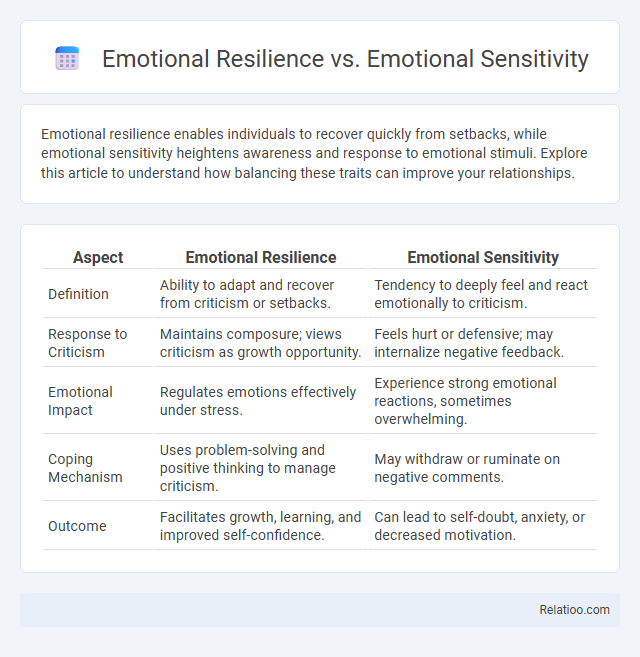Emotional resilience enables individuals to recover quickly from setbacks, while emotional sensitivity heightens awareness and response to emotional stimuli. Explore this article to understand how balancing these traits can improve your relationships.
Table of Comparison
| Aspect | Emotional Resilience | Emotional Sensitivity |
|---|---|---|
| Definition | Ability to adapt and recover from criticism or setbacks. | Tendency to deeply feel and react emotionally to criticism. |
| Response to Criticism | Maintains composure; views criticism as growth opportunity. | Feels hurt or defensive; may internalize negative feedback. |
| Emotional Impact | Regulates emotions effectively under stress. | Experience strong emotional reactions, sometimes overwhelming. |
| Coping Mechanism | Uses problem-solving and positive thinking to manage criticism. | May withdraw or ruminate on negative comments. |
| Outcome | Facilitates growth, learning, and improved self-confidence. | Can lead to self-doubt, anxiety, or decreased motivation. |
Understanding Emotional Resilience and Emotional Sensitivity
Emotional resilience refers to the ability to adapt and recover quickly from stress, adversity, or emotional challenges, enabling individuals to maintain stability during difficult times. Emotional sensitivity involves heightened awareness and responsiveness to emotional stimuli, which can enhance empathy but may also increase vulnerability to stress. Understanding the balance between resilience and sensitivity is crucial for establishing emotional boundaries that protect mental well-being while fostering healthy interpersonal relationships.
Key Differences Between Emotional Resilience and Sensitivity
Emotional resilience involves your ability to recover quickly from stress and adversity, maintaining stability and a positive outlook, while emotional sensitivity refers to how deeply you perceive and react to emotional stimuli, often experiencing stronger feelings. Emotional boundaries serve as protective limits that help you manage interactions and prevent emotional overwhelm, distinguishing between what you absorb and what you deflect. The key difference lies in resilience enabling you to bounce back without being overwhelmed, whereas sensitivity means heightened emotional awareness and reactivity.
The Science Behind Emotional Resilience
Emotional resilience is the brain's capacity to adapt to stress and adversity through neuroplasticity, enabling you to recover from emotional challenges more effectively. Emotional sensitivity involves heightened awareness and responsiveness to emotional stimuli, often linked to increased activity in the amygdala, making individuals more prone to anxiety or empathy. Establishing emotional boundaries helps regulate interactions, preventing emotional overwhelm and supporting resilience by maintaining balanced neural responses and healthier stress management.
The Traits of Highly Sensitive Individuals
Highly sensitive individuals exhibit heightened emotional sensitivity, processing stimuli more deeply and responding intensely to both positive and negative experiences. Their emotional resilience depends on well-established emotional boundaries, which protect their energy and prevent overwhelm by setting limits on external demands and internal responses. You can cultivate emotional resilience by recognizing your sensitivity as a strength and developing clear boundaries that maintain emotional balance and well-being.
Benefits of Developing Emotional Resilience
Developing emotional resilience enhances mental strength, allowing individuals to recover quickly from stress, adversity, and emotional challenges. It fosters better emotional regulation, leading to improved relationships and greater overall well-being by balancing sensitivity with strong boundaries. Emotional resilience supports adaptive coping strategies, reducing vulnerability to anxiety and depression while promoting long-term psychological health.
Challenges Faced by Emotionally Sensitive People
Emotionally sensitive individuals often face significant challenges such as heightened vulnerability to stress, frequent emotional overwhelm, and difficulty establishing clear emotional boundaries, which can result in being easily affected by others' moods and criticism. Developing emotional resilience involves strengthening coping mechanisms and self-awareness to manage intense feelings without becoming reactive or emotionally exhausted. Balancing emotional sensitivity with firm emotional boundaries is crucial for protecting mental well-being and fostering healthier interpersonal relationships.
Building Emotional Resilience: Practical Strategies
Building emotional resilience involves cultivating self-awareness, practicing mindfulness, and developing adaptive coping mechanisms to effectively respond to stress and adversity. Establishing clear emotional boundaries helps protect mental well-being by preventing emotional overload and maintaining healthy relationships. Enhancing emotional sensitivity can improve empathy, but balancing it with resilience ensures you remain grounded and capable of handling challenges without becoming overwhelmed.
Supporting Emotional Sensitivity in Daily Life
Supporting emotional sensitivity in daily life involves recognizing and validating your feelings while maintaining emotional resilience to navigate challenges effectively. Establishing clear emotional boundaries helps protect your well-being by preventing overwhelm and promoting healthy interactions. Building these skills empowers you to honor your sensitivity without becoming emotionally drained or reactive.
Balancing Emotional Resilience and Sensitivity for Well-being
Balancing emotional resilience and emotional sensitivity is crucial for mental well-being, as resilience enables individuals to recover from stress while sensitivity allows for empathy and self-awareness. Developing strong emotional boundaries helps maintain this balance by protecting against emotional overwhelm and fostering healthy relationships. Research from psychology highlights that adaptive boundary-setting combined with emotional acceptance leads to improved stress management and overall emotional health.
Cultivating a Growth Mindset for Emotional Strength
Emotional resilience involves adapting positively to stress and adversity, while emotional sensitivity enhances awareness of one's feelings and others' emotions, and emotional boundaries protect personal well-being by setting limits on emotional engagement. Cultivating a growth mindset supports emotional strength by encouraging learning from emotional challenges and viewing setbacks as opportunities for development. Emphasizing self-awareness, adaptive coping strategies, and assertive communication fosters balanced emotional responses and sustained mental health.

Infographic: Emotional Resilience vs Emotional Sensitivity
 relatioo.com
relatioo.com